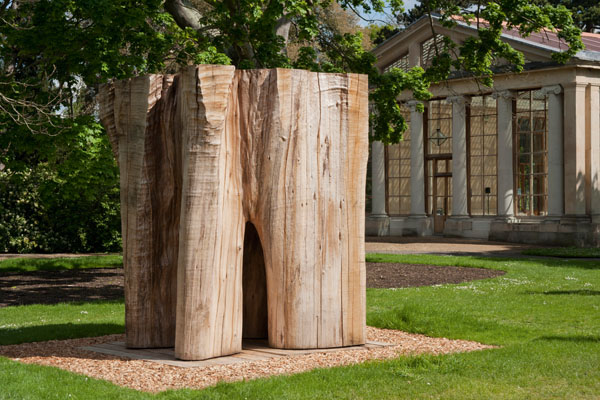The last time I visited Kew was to see the installation of Henry Moore’s sculptures in 2007. Moore’s monumental bronzes made an enormous impact on the botanical gardens, so much so that the gardens were in danger of becoming merely a backdrop for the sculpture. Although a good many people came to see the exhibition, it was felt by the authorities at Kew that the crowds took away a greater appreciation of Henry Moore than they did of the Royal Botanical Gardens. So, when another sculptor was invited to show at Kew, the intention was that he or she would be involved more closely with the aims of the institution. Who better than David Nash (born 1945), known worldwide for his work with trees?
Nash makes sculptures with living trees, training them to assume particular shapes, or sculpts from wood that has died of natural causes, both of which make him an artist of impeccably sound ecological credentials. He arrived at Kew in the spring to be sculptor-in-residence for a year, and was given a cottage on the estate. To be within easy reach of central London is rather different for a man who usually lives in North Wales among the slate tips of Blaenau Ffestiniog. He’s taken advantage of the new situation and been up to town quite a bit, looking at exhibitions (the Henry Moore show at Gagosian was ‘a revelation’) and going to concerts (Nixon in China at the Royal Albert Hall he found particularly thrilling). He’s also been busy in what he calls a ‘wood quarry’ at Kew.
Nash has worked in a number of wood quarries in different parts of the world — places where there is a natural supply of wood for him to sculpt. At Kew he’s been working on an oak tree and, although by no means a performance artist, has had to work in the public eye, on a platform or up in a cherry-picker, in full view of visitors. Did this make him self-conscious? ‘Sometimes. I imagined what people would think who were watching me. But once you’ve got the saw going, you don’t notice anything.’
David Nash emerged in the 1970s in a generation of sculptors that included Tony Cragg and Richard Deacon. His main tools are an axe and a chainsaw, with which he cuts and shapes wood. (He loves the fluidity of gesture he can achieve with a chainsaw.) ‘I prefer to work very early in the morning, from about 7 till 10 or 11. The public come in about 9.30 and it’s 10 o’clock by the time they get up to the wood quarry. It’s on a vista in a kind of amphitheatre with a backing of yew trees, so there were constantly people going by — I was like an interlude on their travels.’ Nash hasn’t worked there every day: he also sees his time at Kew as an important period of research into the archives and laboratories. He has imported a number of his existing sculptures into Kew to give the public an idea of the range of his achievement.
The Gardens looked magnificent on the fine autumn day I visited, and Nash’s sculptures seemed thoroughly in tune with their surroundings. In fact, he is not really an outdoor sculptor, and an important aspect of his presence at Kew are the displays in the Shirley Sherwood Gallery of Botanical Art and the Temperate House. A lot of his wooden sculptures would not survive very long out of doors, so in the past decade Nash has begun to have some of his key works replicated in metal: bronze, cast iron or Corten steel. The installation at Kew is an opportunity to go public with his metal sculptures and to try them out.
Nash describes the metal sculptures as more contentious than the wooden ones and uses the analogy of Bob Dylan going electric. The purists and some of his long-term admirers want him to make only one-off sculptures in wood. Nash notes that in Germany there is a tradition of casting wood sculptures that we don’t have in this country. Bronze or iron casting inevitably carries a taint of the industrial, which may seem to contradict Nash’s core beliefs, but the real test comes with the impact of the imagery in a new material. Inevitably, some forms work better than others. One of the most successful is the bronze ‘Black Butt’, currently squatting outside the Temperate House.
Nash particularly loves the look of his work in the Temperate House among the tree ferns and palms. The wooden pieces here are more visible — the ‘Crack and Warp’ column and ‘Furrowed Oak’ are especially effective — while the dark grey or black bronzes melt into their surroundings and require an effort to locate, especially as there are no labels. By contrast, over towards the Main Gate, in the elegant Regency Conservatory, reposes ‘Cork Spire’, a beautifully constructed heap of Portuguese cork. Nash bought 10,000 tons of the stuff and this is the first time he has worked with it, arranging the shapes of the sloughed bark in concave or convex patterns, to show tan or grey, inside or outside. This is Nash at his most minimal. Outside the Conservatory stands ‘Iron Dome’, a grouping of sky-pointing cast-iron nibs sitting on a bed of Blaenau slate. Also in this area are two new works in charred oak, ‘Flame Column’ and ‘Cairn Column’. Unbelievably, one of the gardeners was planting a young sapling within 12 feet of the latter sculpture, ruining its sight lines and completely cramping its style. It seems that not everyone at Kew is quite so in favour of sculpture being displayed in the gardens…
At this point, Nash is halfway through his residency, which extends until April 2013. Has his stay so far been enlightening? ‘Yes, it has. I’m going away with a lot of forms, mainly from seeds and husks. There’s a lot more I want to look at through the microscopes. What’s in there is a microcosm of what’s outside.’ So it’s not the obvious aspects of Kew — the trees and shrubs — that have particularly impressed Nash (after all, he spends his life with trees), it’s the research side of the institution that appeals. Essentially, he is a collaborator with nature. ‘Nature is our outer skin: we are utterly dependent on it. Nowadays there’s a growing awareness of our role in nurturing nature rather than abusing it. And I’m very economic — that’s also part of working with nature — not wasting anything. The last pieces of a tree go in the stove, and I remember which sculpture or which country they came from.’ Wood is obviously deeply important to him as a means of linking the individual to the environment. Nash talks of the physical truth we understand as gravity or the sense of being inside or outside. For him, sculpture is to do with a similar basic recognition. He insists: ‘I don’t invent forms. I find them and respond to them. I clarify them.’ At Kew, his work assumes its place in a remarkable environment.






Comments